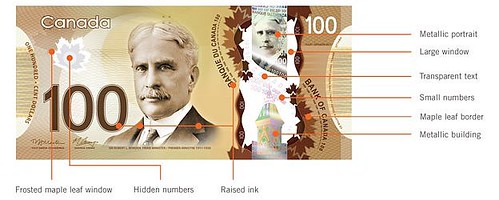
PREV ARTICLE
NEXT ARTICLE
FULL ISSUE
PREV FULL ISSUE
WHY DON'T MORE COUNTRIES USE POLYMER BANKNOTES?
Dick Hanscom pointed out this article from the BBC News about why more countries aren't using polymer banknotes. Thanks!
-Editor

The Bank of Canada began circulating $100 polymer banknotes this week in an effort to combat counterfeiting and reduce costs. So why don't more countries use plastic cash? On the face of it, plastic banknotes have many advantages. They last a long time, and they don't get dirty so quickly - a great advantage in countries with hot climates, and sweaty pockets. "The tropical climate is a challenging environment for banknotes, especially because of high humidity and high temperatures," says polymer researcher Stane Straus. "This causes paper notes to absorb moisture, thus becoming dirty and limp quickly. Polymer notes, on the other hand, do not absorb moisture. "You could say that polymer notes beat paper notes in terms of cleanliness and durability in all climates, but this particular advantage of polymer notes stands out even more in tropical climates." Canada had security, cost and also the environment in mind when it took the decision to go plastic. So why don't more countries cash in on this technology? Today, 23 countries use polymer banknotes, but only six have converted all denominations into plastic. Tom Hockenhull, curator of the Modern Money exhibition at the British Museum, says one reason is that the security gap between paper and plastic notes is closing. It is now possible to make "hybrid notes" - paper notes with a transparent polymer window - he points out. "Paper is much more secure than it used to be and the new [British] £50 note, for example, has features that are extremely hard to counterfeit," he adds. Meanwhile counterfeiters are making progress with polymer. "Polymer is very hard to counterfeit, but it hasn't stopped people trying: good imitations do appear from time to time," Mr Hockenhull says. He also points to some notable disadvantages of polymer banknotes:
In addition, polymer notes cost more to produce in the short-term, which could be a drawback for developing countries. The payback from their extra durability only comes over time. To read the complete article, see: Who, What, Why: Why don't more countries use plastic banknotes? (www.bbc.co.uk/news/magazine-15782723) THE BOOK BAZARREWayne Homren, Editor The Numismatic Bibliomania Society is a non-profit organization promoting numismatic literature. See our web site at coinbooks.org. To submit items for publication in The E-Sylum, write to the Editor at this address: whomren@gmail.com To subscribe go to: https://my.binhost.com/lists/listinfo/esylum All Rights Reserved. NBS Home Page Contact the NBS webmaster 
|